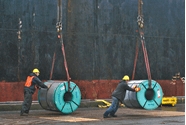Logistics

June 18, 2018
Steel Port Warns of Tariff Consequences
Written by Sandy Williams
The Port of New Orleans is one of the top three U.S. ports for steel imports, taking in 2.48 million tons of steel in 2017. Steel imports represented 80 percent of the port’s breakbulk tonnage and 30 percent of its total cargo tonnage. Turkey was the largest importer of steel at the Port NOLA last year with 344,745 tons followed by Japan (334,561 tons), Brazil (214,270 tons), China-Taiwan (185,406 tons), Vietnam (182,849 tons), South Korea (177,300 tons), Russia (141,725 tons), and China (127,228 tons). All of these trade partners are subject to Section 232 tariffs of 25 percent on steel and 10 percent on aluminum, except for Brazil and South Korea, which have agreed to quotas.
As a major port for steel and aluminum (1.052 million tons last year), the Section 232 tariffs are expected to have a significant impact on port and river commerce. Steel imports from the Gulf travel north by barge and return full of agricultural products designated for export. With steel and aluminum tariffs impacting tonnage shipped, and retaliatory tariffs by allies on agricultural commodities, Port NOLA expects a ripple effect that could reduce barge traffic, increase shipping charges, and push commodity prices higher.
About 80 percent of the steel moving through the Port of New Orleans is transported up the Mississippi River by barges, which are in turn used by Midwest farmers to deliver agricultural products to the grain elevators located on the Lower Mississippi River. “Without those barges moving upriver,” says Port NOLA, “the cost to transport U.S. grain increases, making U.S. agricultural products less competitive with those in other producing countries like Brazil and Russia.”
In a 2014 report on the impact of U.S. ports on the economy, Martin Associates reported U.S. ports generate nearly $4.6 trillion in total economic activity, as well as $321 billion in federal, state and local tax revenue. More than 23 million jobs are supported by port cargo activity.
Martin Associates broke down its statistics to focus on steel and aluminum in a report released in September 2017 for the American Institute for International Steel. The report included major steel seaports on the West Coast, Atlantic Coast, Gulf Coast and Great Lakes. Martin Associates found that port activity for steel and aluminum imports in 2016 supported 1.3 million direct, induced and indirect jobs, and 19.4 billion in tax revenue. Imports of steel and aluminum generated $239.8 billion of total economic activity and 2.3 percent of U.S. GDP in 2016.
In a statement regarding the implementation of tariffs on imported steel and aluminum, Port NOLA President and CEO Brandy Christian wrote on May 31, 2018:
The Port of New Orleans (Port NOLA), like other commercial enterprises, depends upon a strong U.S. economy, and a competitive U.S. steel industry is essential to that goal. Imposing and enforcing tariffs arbitrarily on imported steel and aluminum would negatively impact ports, the larger maritime community, manufacturers throughout the U.S., and other steel-consuming industries.
In 2002, former President Bush imposed steel tariffs on a variety of imported steel products from a limited list of foreign countries under a different provision of law, Section 201 of the Trade Act of 1974. In the ensuing year, Port NOLA suffered a 46 percent decline in steel imports. In addition, the U.S. economy lost 200,000 jobs, more than were employed by the entire steel industry (187,500) at the time. Restricting steel imports would cause wide-ranging economic damage, raising prices for U.S. industries such as construction, transportation, and mining. Section 232 of the Trade Expansion Act, the law on which the Trump administration is relying, is far broader than the law used in 2002 and could result in far steeper tariffs on a wider variety of steel products from a longer list of foreign countries.
Port NOLA believes free and open trade policies, combined with appropriate incentives for U.S. steel producers, is the best means to promote all sectors of the U.S. economy. We will continue communicating to members of the Louisiana delegation that it is in the best interest of the Port and U.S. economy that the administration limit actions related to this matter.
A steel trader located in the Gulf region recently told SMU, “The decrease in steel imports is just now begun to be felt. The worst is yet to come.”






